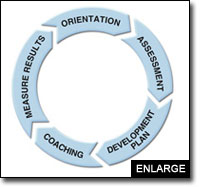Coaching Process
 Prior to beginning the coaching process, there is an Orientation phase when the leader and coach discuss expectations for the coaching process, and the role of the coach and the leader.
Prior to beginning the coaching process, there is an Orientation phase when the leader and coach discuss expectations for the coaching process, and the role of the coach and the leader.
Coaching engagements begin with an Assessment phase, which provides data for the coach and leader to craft a development plan. The data is collected from interviews and assessment instruments.
A Development Plan includes specific activities designed to build new skills and balance current strengths in the leader.
The Coaching phase consists of regular sessions focused on a continuous improvement cycle of skill building, practice, and lessons learned. Many sessions are conducted as face-to-face meetings; however, technology resources are used to support the coaching engagement.
Results are measured mid-way and at the close of the coaching engagement. A brief electronic survey instrument asks peers, direct reports, and the leader’s boss to comment on progress in building new skills and behaviors.
Follow-up Coaching
A reinforcement or follow-up phase of coaching is available as needed. The purpose of coaching follow-up is to provide a leader with continued objective and structured reflection related to his/her development.
The benefit of a follow-up coaching phase is that a leader continues to have:
Support to further reinforce the skill focus identified earlier at the onset of the coaching engagement;
Unbiased perspectives on emerging issues; and
Opportunities for focus on new trends.
Coaching Timeline
Phase |
Time |
Activities |
Orientation |
1 session |
Review coaching expectations, coaching process, and roles of coach and leader. |
Assessment |
1 session |
Review, interview, and assessment results, and performance records. |
Development Plan |
1 session |
Identify opportunities for improvement; prioritize, and set measurable development goals |
Coaching |
4-8 sessions |
Engage in skill building activities that align with development goals, practice new skills and reflect on results with coach. |
Measure Results |
1 session |
Interviews; feedback from others, self assessment |